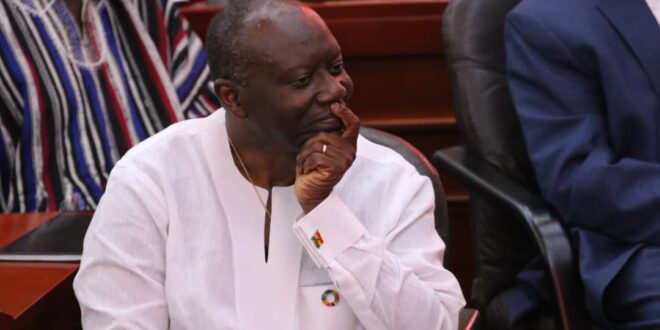The e-levy is now serving the purpose that the Agyapa deal would have done therefore, the government must abort the plan to collateralize the mineral resources, a Professor at the University of Ghana Business School, Lord Mensah, has said.
Prof Mensah explained that as of the time the Agyapa deal was being introduced, Ghana was not able to access to the Eurobond market to raise revenue for development.
Following the inability to raise funds from the Eurobond market, a desperate Ghana then needed to look for ways to raise funds internally to embark on the development projects hence, the introduction of the e-levy.
With the implementation of the e-levy policy, he said, the government is, at the moment, getting the needed revenue for the projects.
In his view, the e-levy has replaced the Agaypa deal.
Speaking on the New Day show on TV3 with Johnnie Hughes, Wednesday May 18, he said “I don’t and I wasn’t expecting Agyapa to come back again. E-levy has come, E-levy is more or less, for me, a replacement of Agyapa.”
When asked to explain further, he said “You have your human resources that you are taxing their activities, the transactions that they make and then you have the natural resources deposited as gold. At the time that we were looking at the Agyapa deal, more or less, the country was desperately looking for money. The signals were clear that the Eurobond market, where we raised the billions of dollars to offset the existing debts and get some proceeds for development this country, we were getting to a point where the investor communities have started shying away from us.
“So at that point, let us look for alternative of raising money. So, in the form of engineering, let us see how we can collateralize some of our natural resources and get upfront funds and then in the end, we use it for the purpose that the Eurobond could have given us.
“Now, we find it difficult going to the Eurobond market and one of the justifications of the e-levy was to get a replacement for the funds that we get from the Eurobond market, so effectively, the timing for me is wrong.”
He further asked the Finance Minister Ken Ofori Atta to state clearly how the Agyapa deal will benefit Ghana because the benefits to accrue from the transaction have not been clearly stated and explained by the government.
Prof Mensah said “Looking at the posture and packaging of Agyapa, it gives a signal as if the gold that we have is, more or less, for a corporates entity.
“So we are engineering to get an upfront funds and then, once we get the upfront fund, if you want to do analysis, the Finance Minister should be able to tell us that when we get the upfront fund from the Agyapa deal, this is what we are going to use the money for and these are the possible benefits that the country will generate from from it as compared to, if you are to wait and use the proceeds that come from your gold resources.
“So effectively these comparisons are not clear. That aspect of the economic justification is not coming out. It is more emotional and ego-driven than looking at it holistically.”
The Finance Minister, Ken Ofori-Atta recent said that the government has not abandoned the controversial deal.
Addressing a press conference in Accra on Thursday May 12, Mr Ofori-Atta said “My firm philosophical belief really is that the capital markets are meant for something that will lead us to equity resources and we are not leveraging on it. Therefore, it is not the question of whether monetization of mineral royalties or listing of the company is bad or good.
“It is good because that is how you raise the resources. The question is the process of doing that. If you have a problem with the process just articulate it, lets cure it but let us not drop something that will be good for us that will reduce our debt exposure. So those are two very different questions. How best to do it as opposed to, don’t do it. My mind is still there, I know the president has mentioned something about that going through the AG, Parliament to do that.
“But it is not something that is an asset to the country that one need to drop. You need to examine all your equity and debt positions and the best choice for the country. We will never have done Free SHS if we listened to other people that is 400,000 lives that have a chance to do something , we would have stopped shot at e-levy because of the noise, suddenly we have a tax handle that will be phenomenally important for the country. so we need to look at that.”
Following this announcement, twenty four Civil Society Organizations (CSOs) including the Africa Centre for Energy Policy (ACEP), the Ghana Centre For Democratic Development (CDD) and the Centre for Extractives and Development Africa (CEDA), in a joint statement, said that the Agyapa deal is inherently illegal.
In their view, the President holds the minerals in trust, they are not the President’s property or his government’s.
So, they said, it is required that the agreement be returned to Parliament for approval.
“Refusing to do so means we will go to court,” they said in reaction to the Finance Minister’s comment.
“Ladies and gentlemen, we reiterate that the coalition is not against alternative actions to optimise the mineral sector. However, we do not support the current attempt to sell the risk-free right of the country to royalties and the attendant questions around the transaction.
“The Africa Mining Vision is an important diagnostic instrument to identify ways to maximise mineral resources, and Ghana must show commitment to the regional document rather than short term gains to a set of politically connected people.”
The conversation on Agyapa came up recent after the Minerals Income Investment Fund (MIIF) was reported to have said that it is redesigning its strategy for listing its wholly owned subsidiary Agyapa Royalties on the London Stock Exchange and the Ghana Stock Exchange after being named the best financial institution in the mining sector by the French-based publication Forbes Monaco.
Forbes recognised MIIF’s strategic acquisition of over 14 million shares and a roughly 4.65% stake in Asante Gold Corporation, a Canadian- and Frankfurt-listed gold production company which operates in Ghana.
It is recalled that in his first state-of-the-nation address to that Parliament in his second term in office on Tuesday, March 9, President Nana Addo Dankwa Akufo-Addo said “in the course of this session of Parliament, Government will come back to engage the House on the steps it intends to take on the future of the Agyapa transaction”.
The agreement, which was approved by the Seventh Parliament on Friday, August 14, 2020, had to be withdrawn after a corruption-risk assessment was conducted by then Special Prosecutor, Martin Alamisi Amidu.
Resigning a few days afterwards, the Special Prosecutor accused President Akufo-Addo of interfering in his assessment on the deal under the Minerals Income Investment Fund Act, 2018 (Act 978).
“The reaction I received for daring to produce the Agyapa Royalties Limited Transactions anti-corruption report convinces me beyond any reasonable doubt that I was not intended to exercise any independence as the Special Prosecutor in the prevention, investigation, prosecution, and recovery of assets of corruption,” Mr Amidu said in his resignation letter to the president.
The Executive Secretary to the President, Nana Asante Bediatuo, replied the resignation letter and said a mere meeting between the president and a Special Prosecutor cannot be said to be interference.
“Your accusation of interference with your functions simply on account of the meeting the president held with you is perplexing. In exercise of what you considered to be your powers under Act 959, you had voluntarily proceeded to produce the Agyapa Report.
“The president had no hand in your work. Without prompting from any quarter within the Executive, you delivered a letter purporting to be a copy of you report to the president.
“The purpose of presenting a copy of the Agyapa report to the president is decipherable from paragraph 32 of your letter to the president in which you indicated that you hoped the report will be ‘used to improve current and future legislative and executive actions to make corruption and corruption-related offences very high risk enterprise in Ghana’.”
On Tuesday, March 9, President Akufo-Addo hinted of sending the deal back to Parliament for re-consideration.
Source: 3news

Send your news stories to myghanamedia@gmail.com and Chat with us via WhatsApp on +233 200818719
 MYGHANAMEDIA.COM Best Source Of Latest News
MYGHANAMEDIA.COM Best Source Of Latest News




